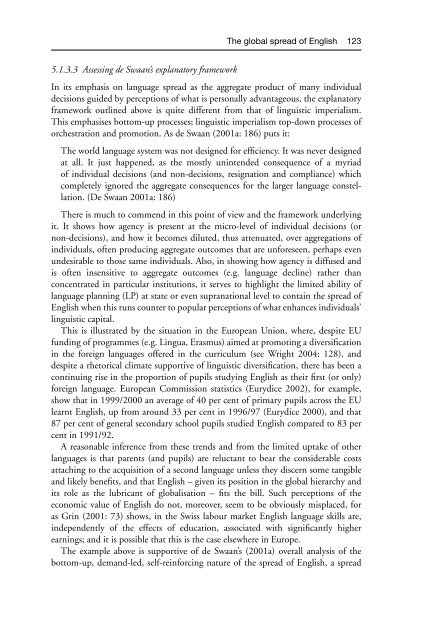Gibson Ferguson Language Planning and Education Edinburgh ...
Gibson Ferguson Language Planning and Education Edinburgh ...
Gibson Ferguson Language Planning and Education Edinburgh ...
Create successful ePaper yourself
Turn your PDF publications into a flip-book with our unique Google optimized e-Paper software.
The global spread of English 123<br />
5.1.3.3 Assessing de Swaan’s explanatory framework<br />
In its emphasis on language spread as the aggregate product of many individual<br />
decisions guided by perceptions of what is personally advantageous, the explanatory<br />
framework outlined above is quite different from that of linguistic imperialism.<br />
This emphasises bottom-up processes; linguistic imperialism top-down processes of<br />
orchestration <strong>and</strong> promotion. As de Swaan (2001a: 186) puts it:<br />
The world language system was not designed for efficiency. It was never designed<br />
at all. It just happened, as the mostly unintended consequence of a myriad<br />
of individual decisions (<strong>and</strong> non-decisions, resignation <strong>and</strong> compliance) which<br />
completely ignored the aggregate consequences for the larger language constellation.<br />
(De Swaan 2001a: 186)<br />
There is much to commend in this point of view <strong>and</strong> the framework underlying<br />
it. It shows how agency is present at the micro-level of individual decisions (or<br />
non-decisions), <strong>and</strong> how it becomes diluted, thus attenuated, over aggregations of<br />
individuals, often producing aggregate outcomes that are unforeseen, perhaps even<br />
undesirable to those same individuals. Also, in showing how agency is diffused <strong>and</strong><br />
is often insensitive to aggregate outcomes (e.g. language decline) rather than<br />
concentrated in particular institutions, it serves to highlight the limited ability of<br />
language planning (LP) at state or even supranational level to contain the spread of<br />
English when this runs counter to popular perceptions of what enhances individuals’<br />
linguistic capital.<br />
This is illustrated by the situation in the European Union, where, despite EU<br />
funding of programmes (e.g. Lingua, Erasmus) aimed at promoting a diversification<br />
in the foreign languages offered in the curriculum (see Wright 2004: 128), <strong>and</strong><br />
despite a rhetorical climate supportive of linguistic diversification, there has been a<br />
continuing rise in the proportion of pupils studying English as their first (or only)<br />
foreign language. European Commission statistics (Eurydice 2002), for example,<br />
show that in 1999/2000 an average of 40 per cent of primary pupils across the EU<br />
learnt English, up from around 33 per cent in 1996/97 (Eurydice 2000), <strong>and</strong> that<br />
87 per cent of general secondary school pupils studied English compared to 83 per<br />
cent in 1991/92.<br />
A reasonable inference from these trends <strong>and</strong> from the limited uptake of other<br />
languages is that parents (<strong>and</strong> pupils) are reluctant to bear the considerable costs<br />
attaching to the acquisition of a second language unless they discern some tangible<br />
<strong>and</strong> likely benefits, <strong>and</strong> that English – given its position in the global hierarchy <strong>and</strong><br />
its role as the lubricant of globalisation – fits the bill. Such perceptions of the<br />
economic value of English do not, moreover, seem to be obviously misplaced, for<br />
as Grin (2001: 73) shows, in the Swiss labour market English language skills are,<br />
independently of the effects of education, associated with significantly higher<br />
earnings; <strong>and</strong> it is possible that this is the case elsewhere in Europe.<br />
The example above is supportive of de Swaan’s (2001a) overall analysis of the<br />
bottom-up, dem<strong>and</strong>-led, self-reinforcing nature of the spread of English, a spread






